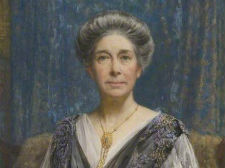On This Day
On This Day, 14 February 1916
On 14, Feb 2016 | In On This Day | By Nicola Gauld
Evening Despatch
Monday 14 February 1916
INFANT WELFARE
Organisation of Meetings for Mothers
The problem of infant welfare has been exciting the serious attention of the Birmingham Women’s Suffrage Society for some time. As a result meetings for the mothers are to be organised and addressed by eminent doctors and women with a wide knowledge of the subject.
To inaugurate this series a meeting was held in the Queen’s College, Birmingham, on Saturday afternoon, at which there was a representative attendance.
Mrs. Osler, who presided, reviewed the work of the National Union of Women’s Suffrage Society during the war, referring particularly to their watchfulness over the welfare of mothers and infants. One of the first effects of the war were the increase of infant mortality and of juvenile crime. Since our men were absorbed and preoccupied in defending and preserving the country it was left to the women to take up this duty of safeguarding the coming race, who would have to “carry on” after the war.
TRAGEDY IN FIGURES
Dr. Barbara Tchaykovsky, B.Sc., of Hanow, formerly house physician at the Royal Free Hospital, pointed out that in this country of the 800,000 babies born each year 100,000 died. A very much larger number, of which they had no estimate in figures, suffered from the conditions which killed the weakliest. In Birmingham, according to their Medical Officer of Health’s report, 23,000 babies were born each year, and 3,000 died in the first year.
Dr. Tchaykovsky advocated the setting up of a much larger number of child welfare centres, and emphasised the necessity of helping the ignorant, careless, thriftless mother. She commended the work of feeding expectant and nursing mothers, as it had already been organised by the Birmingham Women’s Suffrage Society.
WAR WORK DANGERS
As to the question of women factory workers, the speaker said if women’s work was necessary to win the war surely their children should be properly cared for while they were doing that work. There were also the potential mothers to be cared for, and it should be insisted on that women, if it were necessary for them to perform hard physical work, should be well cared for and safeguarded.
To each munition factory a crèche should be attached where the babies might be cared for with every modern requirement that science knew.
Mrs. George Cadbury briefly outlined the work that was being accomplished in the schools, and a lively discussion was opened by Miss Marlin, of the Selly Oak School for Mothers.



